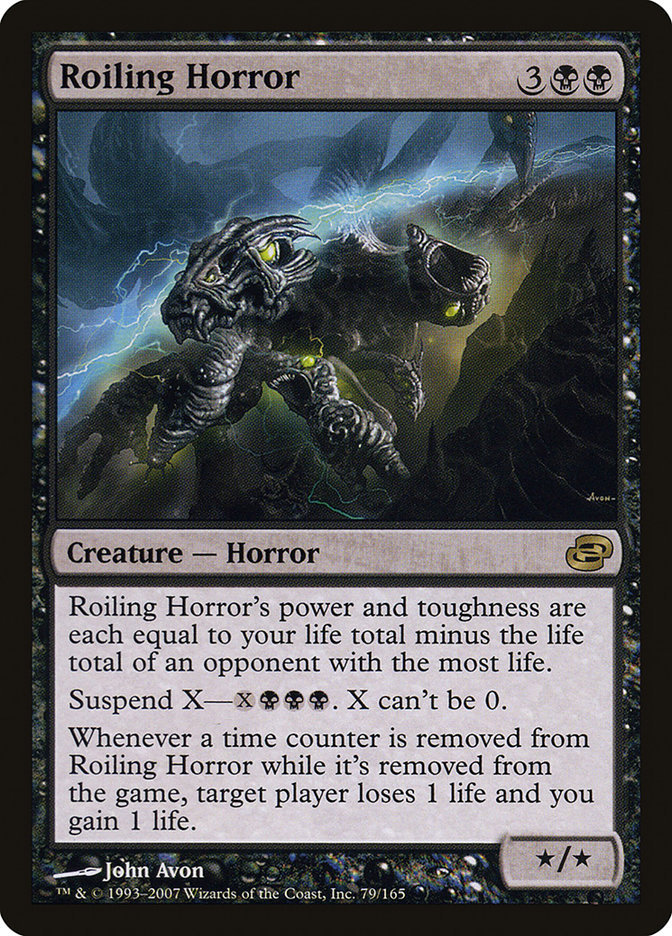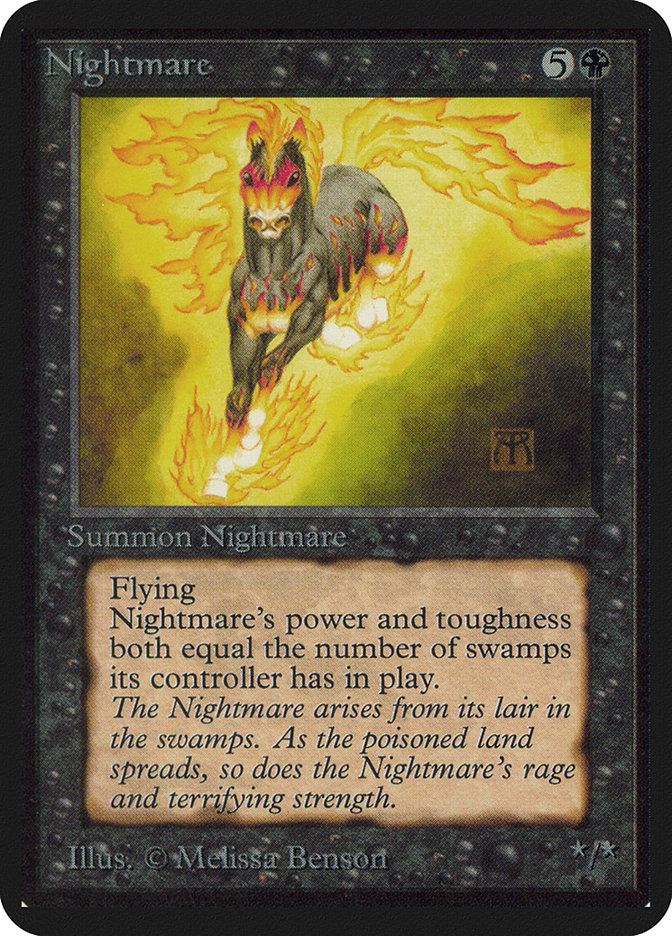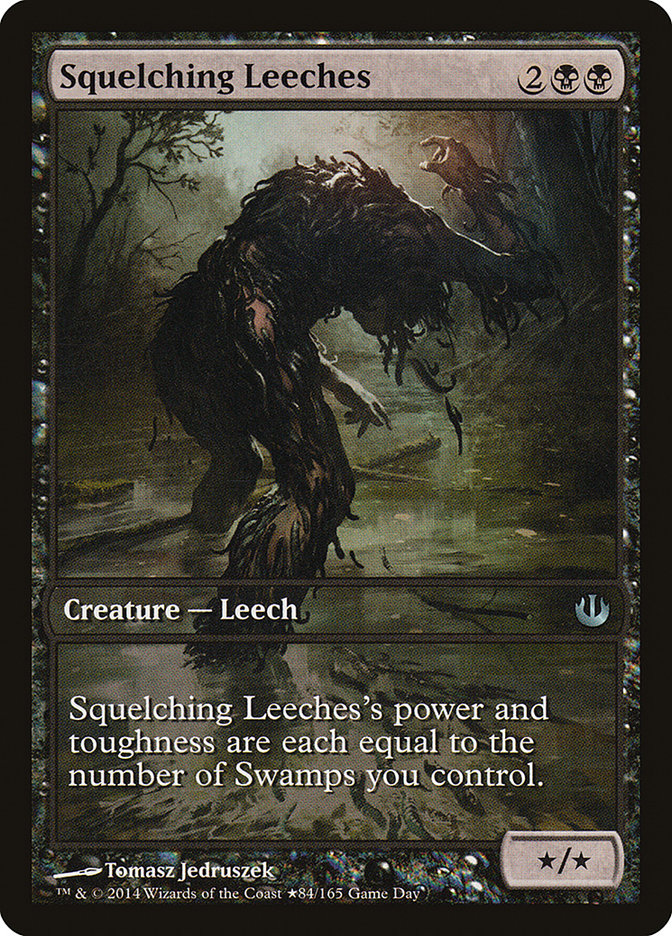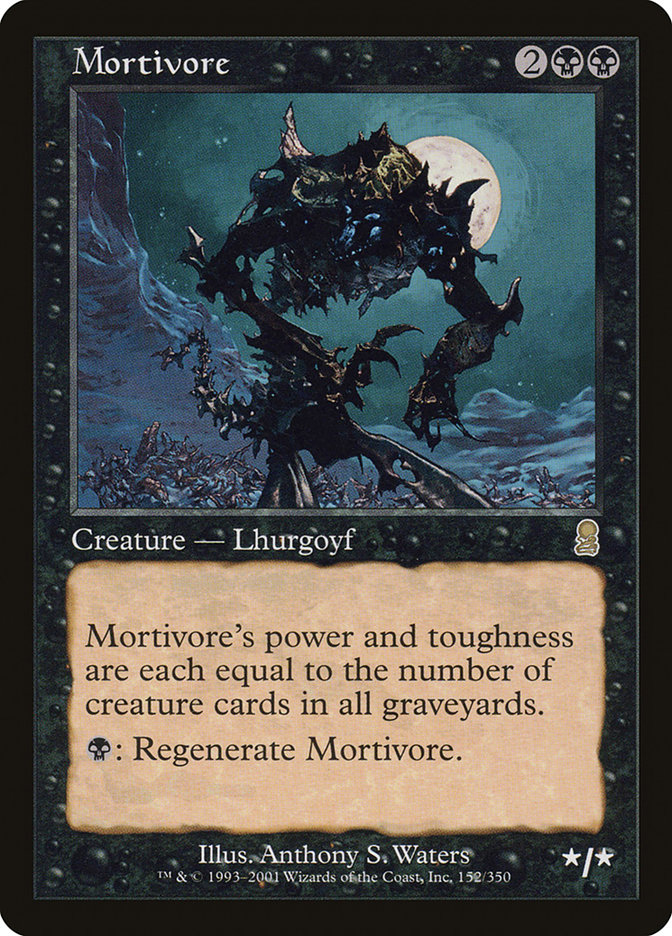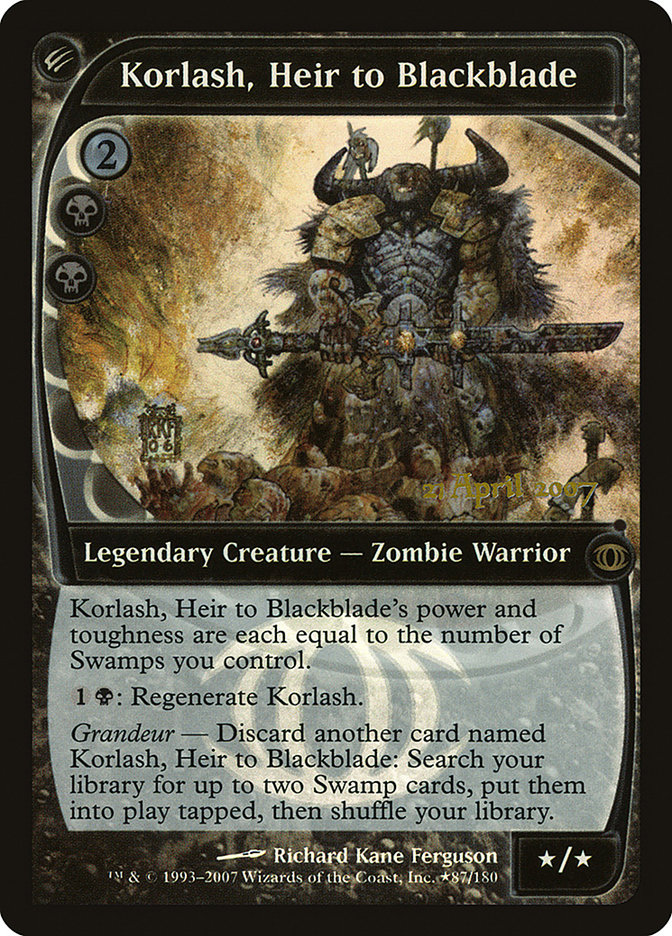Horror enojado Carta MTG
| El coste de maná | |
| Costo de maná convertido | 5 |
| Rareza | Extraña |
| Tipo | Criatura — Horror |
| Habilidades | Suspend |
| Liberado | 2007-02-02 |
| Coleccione símbolo | |
| Coleccione nombre | Planar Chaos |
| Coleccione código | PLC |
| Fuerza | * |
| Tenacidad | * |
| Número | 79 |
| Frame | 2003 |
| Disposición | Normal |
| Border | Negra |
| Ilustrado por | John Avon |
Texto de la carta
Tanto la fuerza como la resistencia del Horror enojado son iguales a tu total de vidas menos el total de vidas del oponente con más vidas. Suspender X—{X}{B}{B}{B}. X no puede ser 0. Siempre que se remueva un contador de tiempo del Horror enojado mientras está removido del juego, el jugador objetivo pierde 1 vida y tú ganas 1 vida.
Cartas Similares
En Magic: The Gathering, Roiling Horror se destaca como una carta de criatura única para infligir daño a los oponentes basado en el número de pantanos que uno controla. Es similar a cartas como Pesadilla, que también escalan en poder y resistencia con el número de pantanos en el campo de batalla. Sin embargo, Roiling Horror ofrece una amenaza persistente con su habilidad de regresar al campo de batalla cuando cambia el total de vida de un oponente.
Comparativamente, Sanguijuelas de Succión es otra criatura que crece con el dominio de los pantanos pero carece del retorno resiliente que posee Roiling Horror. Mortivore ofrece un enfoque diferente, aumentando de tamaño por cada carta de criatura en todos los cementerios, no tiene el efecto de gatillo del total de vida. Luego está Korlash, Heredero de Fauce Negra, que crece con el número de pantanos que posees y tiene la habilidad de grandiosidad para una versatilidad añadida, sin embargo, aún no iguala la dinámica de total de vida punitivo de Roiling Horror.
La evaluación de estas similitudes y diferencias muestra la posición única de Roiling Horror en estrategias de mazo centradas en tipos de tierra y manipulación del total de vida, una adición amenazante para los jugadores que favorecen el mana negro y tácticas de control.
Pros de la carta
Ventaja de cartas: El poder de Roiling Horror radica en su potencial para alterar significativamente la dinámica del campo de batalla cada vez que ataca. Con cada vida perdida por tu oponente, fortaleces tu mano, consolidando tu control sobre el flujo del juego.
Aceleración de recursos: La habilidad única de esta criatura puede interrumpir los recursos del oponente mientras refuerza los tuyos. A medida que tu total de vida aumenta, la capacidad de Roiling Horror para acelerar tu ventaja se hace más pronunciada, dándote la ventaja a medida que avanza el juego.
Velocidad instantánea: La capacidad de Roiling Horror para reaccionar a velocidad instantánea durante el mantenimiento ofrece flexibilidad táctica. Esta característica te permite adaptarte a un estado de juego en evolución, poniendo presión en tus rivales para que respondan rápidamente o arriesguen quedar rezagados a medida que tu ventaja crece.
Contras de la carta
Requisito de descarte: La habilidad de Roiling Horror puede obligarte a descartar cartas, activos estratégicos que puedas querer conservar en mano, para maximizar su potencial en el campo de batalla.
Costo específico de maná: El costo de lanzamiento de Roiling Horror exige tanto maná negro como genérico, lo cual puede no alinearse con mazos que no cuenten con un fuerte componente de maná negro o capacidad para bases de maná flexibles, lo que potencialmente lo convierte en una elección menos versátil.
Costo de maná comparativamente alto: Con un valor de maná en el extremo superior de la escala, desplegar a Roiling Horror puede ser una inversión significativa, lo cual puede restarle capacidad para jugar otras cartas o destinar recursos en otros lugares durante momentos críticos del juego.
Razones para incluir a Roiling Horror en tu colección
Versatilidad: Roiling Horror es una elección dinámica para mazos negros que buscan aprovechar el poder de las criaturas escalables. A medida que avanza el juego, se vuelve más fuerte con el mantenimiento de cada jugador, convirtiéndose en una amenaza en constante evolución en el tablero.
Potencial de combo: La habilidad única de esta criatura para acumular contadores -1/-1 puede ser aprovechada en combinación con diversas estrategias. Las cartas que proliferan o modifican contadores pueden ser particularmente sinérgicas, amplificando la presencia impactante del Horror.
Relevancia meta: Dado su potencial en tamaño e impacto, Roiling Horror puede adaptarse a múltiples escenarios de juego. Prospera en ambientes con juegos más largos, donde su capacidad para perturbar a los oponentes a través de la pérdida de vida y el aumento de tamaño puede volverse cada vez más formidable.
Cómo vencer a Roiling Horror
Roiling Horror es una carta poderosa en MTG que puede alterar tu juego si no se controla temprano. Su fuerza radica en el hecho de que crece durante el mantenimiento de cada jugador si su total de vida es menor, y eso puede salir rápidamente de control. Al enfrentarte a un Roiling Horror, es esencial priorizar estrategias de ganancia de vida para asegurarte de que tu total de vida esté al mismo nivel o por encima del de tu oponente. Esto evita que el Horror obtenga esos contadores cruciales +1/+1.
Los hechizos de eliminación directa son la perdición de Roiling Horror. Cartas como Hoja condenatoria, Asesinato, o Sendero al destierro pueden eliminarlo antes de que se convierta en una amenaza masiva. Los contrahechizos también juegan un papel clave cuando se lanza Roiling Horror, neutralizando la amenaza antes de que llegue al campo de batalla. Pero si el combate es inevitable, el bloqueo de chump se vuelve necesario, por lo que mantener una corriente de fichas de criatura puede ser una táctica valiosa. Asegurarte de tener estos aspectos cubiertos te preparará para mantener a Roiling Horror bajo control y permanecer en control del juego.
En resumen, aunque Roiling Horror presenta un desafío formidable, estrategias adecuadas de manejo de vida y eliminación pueden asegurar tu dominio sobre esta criatura aterradora, manteniéndote un paso adelante en el juego de MTG.
Donde comprar
Si estás buscando comprar una carta MTG Horror enojado de un coleccione específico como Planar Chaos, existen varias opciones confiables que debes considerar. Una de las fuentes principales es tu tienda de juegos local, donde a menudo puedes encontrar paquetes de refuerzo, cartas individuales y mazos preconstruidos de colecciones actuales y pasadas. A menudo ofrecen el beneficio adicional de una comunidad donde puedes intercambiar con otros jugadores.
Para un inventario más amplio, particularmente de colecciones más antiguos, mercados en línea como TCGPlayer, Card Kingdom y Card Market ofrecen amplias selecciones y te permiten buscar cartas de colecciones específicos. Las plataformas de comercio electrónico más grandes como eBay y Amazon también tienen listados de varios vendedores, lo que puede ser un buen lugar para buscar productos sellados y hallazgos raros.
Además, el sitio oficial de Magic suele tener un localizador de tiendas y listas de minoristas para encontrar Wizards of the Productos con licencia costera. Recuerde comprobar la autenticidad y el estado de las cartas al comprarlas, especialmente a vendedores individuales en mercados más grandes.
A continuación se muestra una lista de algunos sitios web de tiendas donde puede comprar las Horror enojado y otras cartas MTG:
 COMPRAR
COMPRAR BurnMana es un socio oficial de TCGPlayer
- eBay
- Card Kingdom
- Card Market
- Star City Games
- CoolStuffInc
- MTG Mint Card
- Hareruya
- Troll and Toad
- ABU Games
- Card Hoarder Magic Online
- MTGO Traders Magic Online
Ver productos MTG
Legalidades
Formatos de Magic the Gathering donde Horror enojado tiene restricciones
| Formato | Legalidad |
|---|---|
| Commander | Legal |
| Legacy | Legal |
| Modern | Legal |
| Oathbreaker | Legal |
| Vintage | Legal |
| Duel | Legal |
| Predh | Legal |
| Penny | Legal |
Reglas e información
La guía de referencia para las reglas de las cartas Horror enojado de Magic: The Gathering proporciona las reglas oficiales, las erratas emitidas, así como un registro de todas las modificaciones funcionales que se han producido.
| Fecha | Texto |
|---|---|
| 01/02/2007 | Si tu total de vida es menor o igual al total de vida del oponente con más vida, la resistencia de Horror rodante es de 0 o menos. Se pondrá en el cementerio de su propietario como una acción basada en el estado. |
| 01/02/2007 | Nunca eliges a un oponente, y el oponente al que mira el Horror Revoloteante nunca está "bloqueado". El Horror Revoloteante mira continuamente los totales de vida de todos los oponentes y usa el valor más alto. |
| 18/06/2021 | Una criatura lanzada usando la habilidad de en suspenso entrará al campo de batalla con prisa. La tendrá hasta que otro jugador obtenga control sobre ella. (En algunos casos raros, otro jugador puede obtener control sobre el hechizo de la criatura misma. Si esto ocurre, la criatura no entrará al campo de batalla con prisa.) |
| 18/06/2021 | Al resolverse la segunda habilidad desencadenada, debes lanzar la carta si puedes hacerlo. Debes hacerlo incluso si requiere objetivos y los únicos objetivos legales son aquellos que realmente no deseas elegir. Se ignoran los permisos de timing basados en el tipo de carta. |
| 18/06/2021 | Las cartas desterradas con suspender quedan desterradas boca arriba. |
| 18/06/2021 | Exiliar una carta con suspender no es lanzar esa carta. Esta acción no utiliza la pila y no se puede responder a ella. |
| 18/06/2021 | Si un efecto se refiere a una "carta suspendida", eso significa una carta que (1) tiene suspender, (2) está desterrada, y (3) tiene uno o más contadores de tiempo sobre ella. |
| 18/06/2021 | Si la carta tiene en su costo de maná, debes elegir 0 como el valor de X al lanzarla sin pagar su costo de maná. |
| 18/06/2021 | Si la primera habilidad activada de suspender (la que quita contadores de tiempo) es contrarrestada, no se quita ningún contador de tiempo. La habilidad se activará nuevamente al comienzo del próximo mantenimiento del propietario de la carta. |
| 18/06/2021 | Si la segunda habilidad desencadenada es contrarrestada, la carta no se puede lanzar. Permanece desterrada sin contadores de tiempo y ya no está suspendida. |
| 18/06/2021 | Si el hechizo requiere cualquier objetivo, esos objetivos se eligen cuando se lanza finalmente el hechizo, no cuando es desterrado. |
| 18/06/2021 | Si esto está suspendido, entonces cuando se quite el último contador de tiempo de él, tanto su habilidad desencadenada como la parte de "lanzar este hechizo" de la capacidad de suspensión se activarán. Se pueden poner en la pila en cualquier orden. |
| 18/06/2021 | Si no puedes lanzar la carta, tal vez porque no hay objetivos legales disponibles, permanece desterrada sin contadores de tiempo y ya no está suspendida. |
| 18/06/2021 | Si lanzas una carta "sin pagar su coste de maná", como con suspensión, no puedes elegir lanzarla por otros costes alternativos. Sin embargo, puedes pagar costes adicionales. Si la carta tiene algún coste adicional obligatorio, debes pagar esos si deseas lanzar la carta. |
| 18/06/2021 | Suspend es una palabra clave que representa tres habilidades. La primera es una habilidad estática que te permite desterrar la carta de tu mano con el número especificado de contadores temporales (el número antes del guión) pagando su coste de suspensión (listado después del guión). La segunda es una habilidad desencadenada que elimina un contador temporal de la carta suspendida al comienzo de cada uno de tus mantenimientos. La tercera es una habilidad desencadenada que te obliga a lanzar la carta cuando se retire el último contador temporal. Si lanzas un conjuro de criatura de esta manera, obtiene prisa hasta que pierdas el control de esa criatura (o, en casos raros, pierdas el control del conjuro de criatura mientras está en la pila). |
| 18/06/2021 | El valor de mana de un hechizo lanzado sin pagar su coste de mana se determina por su coste de mana, aunque ese coste no fue pagado. |
| 18/06/2021 | Cuando se retira el último contador de tiempo, se activa la segunda habilidad desencadenada de suspender (aquella que te permite lanzar la carta). No importa por qué se retiró el último contador de tiempo o qué efecto lo quitó. |
| 18/06/2021 | Nunca estás obligado a activar las habilidades de maná para pagar costos, por lo que si hay un costo adicional de maná obligatorio (como el de Thalia, Guardiana de Thraben), puedes optar por no activar las habilidades de maná para pagarlo y, por lo tanto, no lograr lanzar la carta suspendida, dejándola en el exilio. |
| 18/06/2021 | Puedes desterrar una carta de tu mano usando la habilidad de suspender en cualquier momento en que podrías lanzar esa carta. Considera su tipo de carta, cualquier efecto que modifique cuándo podrías lanzarla (como destello) y cualquier otro efecto que te impida lanzarla (como la habilidad del Mago entrometido) para determinar si y cuándo puedes hacer esto. La capacidad de completar realmente todos los pasos para lanzar la carta es irrelevante. Por ejemplo, puedes desterrar una carta con la habilidad de suspender que no tenga coste de maná o que requiera un objetivo incluso si en ese momento no hay objetivos legales disponibles. |
